ACF vs Meta Box: In-Depth Comparison in 2024

Key Points at a Glance
- ACF and Meta Box Origins: ACF, developed by Eliot Condon in 2011 and now under Delicious Brains, is a top solution for managing meta fields. Meta Box, established in 2010 by the eLightUp agency, is the second most popular plugin in this domain.
- Business Models: ACF offers a dual approach with free Basic and paid Pro versions, simplifying features for users. Meta Box provides a free plugin with paid add-ons, offering modular customization options.
- Features Comparison: Both ACF and Meta Box offer intuitive interfaces for managing Custom Post Types and Taxonomies, with ACF boasting 30 free field types and 4 paid options, while Meta Box provides 50 free field types and 1 paid option.
- Pricing: ACF offers yearly licenses for 1 or unlimited websites, while Meta Box provides six tiers including a lifetime option, potentially making it more cost-effective for agencies or users with multiple websites.
- Support and Documentation: Both ACF and Meta Box offer extensive documentation and support forums, with personalized support available for Pro users, ensuring timely assistance for their specific needs.
- Display Options: These plugins offer various methods for showcasing field values on the frontend, including code functions, shortcodes, and integrations with tools like Advanced Views, which offers modern and efficient content display templates.
- Summary: ACF, akin to MacOS, offers a seamless UI and extensive community support, ideal for users prioritizing user experience. Meta Box, like Windows, provides robust customization options and APIs, suited for developers adept at working with code.
Table of Contents
If you're in search of a meta fields plugin or exploring alternatives to your current one, this article will introduce you to two of the most popular and widely recognized plugins for managing Custom Post Types (CPTs) and meta fields: ACF and Meta Box.
Note: "ACF" is a commonly used abbreviation for the Advanced Custom Fields plugin. To ensure clarity, we will use "ACF" as the name in the table comparisons.
If you're familiar with any of the plugins mentioned above, you're likely aware that they not only enable you to incorporate custom fields into your pages, posts, and CPTs but also provide intuitive interfaces for creating Custom Post Types and Taxonomies. Additionally, they offer features such as custom option pages and custom Gutenberg blocks.
We've handpicked these top two plugins and will compare their key aspects, empowering you to select the one that aligns best with your requirements.
Tip: it's a one-to-one comparison. If you're interested in reviewing the top three plugins for meta fields all at once in the table format, you can find them in this article.
1. Maintainers and business models
In our quest to delve deeper into the realm of meta-field plugins for WordPress, it's crucial to understand the foundations and structures of the leading players in this arena. Let's embark on a journey to unravel the backstory and business models behind it.
Origins and maintainers
ACF
ACF traces its roots back to 2011 when it emerged as a personal project of Eliot Condon. Since its inception, ACF has skyrocketed in popularity, establishing itself as the go-to solution for managing meta fields in WordPress. However, it's essential to note that ACF's journey didn't stop with its creation; rather, it evolved under the stewardship of Delicious Brains, an agency that is now part of WPEngine. This transition ensured that ACF continued to thrive and innovate under the guidance of experienced developers.
Meta Box
On the other hand, Meta Box entered the scene in 2010, boasting a rich history in the realm of WordPress meta field management. While not as widely recognized as ACF, Meta Box holds its ground as the second most popular plugin for handling meta fields. The plugin is nurtured and maintained by the dedicated team at eLightUp agency, ensuring its ongoing development and support for users.
Business models
ACF
In the realm of business models, ACF adopts a dual approach, comprising a free Basic plugin and a paid Pro plugin. This strategy allows users to access essential functionality through the free version while unlocking advanced features and capabilities with the Pro version. By bundling all Pro features into a single product, ACF simplifies the decision-making process for users, offering a comprehensive solution for their meta-field needs.
Meta Box
Conversely, Meta Box adopts a slightly different approach to its business model. Similar to ACF, Meta Box offers a free plugin, providing users with a foundational toolkit for managing meta fields. However, where Meta Box distinguishes itself is in its provision of paid add-ons. Rather than bundling all premium features into one package, Meta Box allows users to select and purchase specific add-ons based on their requirements. This modular approach affords greater flexibility and cost-effectiveness, empowering users to tailor their experience to suit their unique needs.
2. Features comparison
CPT and Taxonomy Management
While WordPress offers the capability to create Custom Post Types (CPTs) and Taxonomies out-of-the-box, it lacks a user-friendly interface for this purpose. The plugins under review bridge this gap by providing intuitive tools for managing CPTs and Taxonomies.
ACF
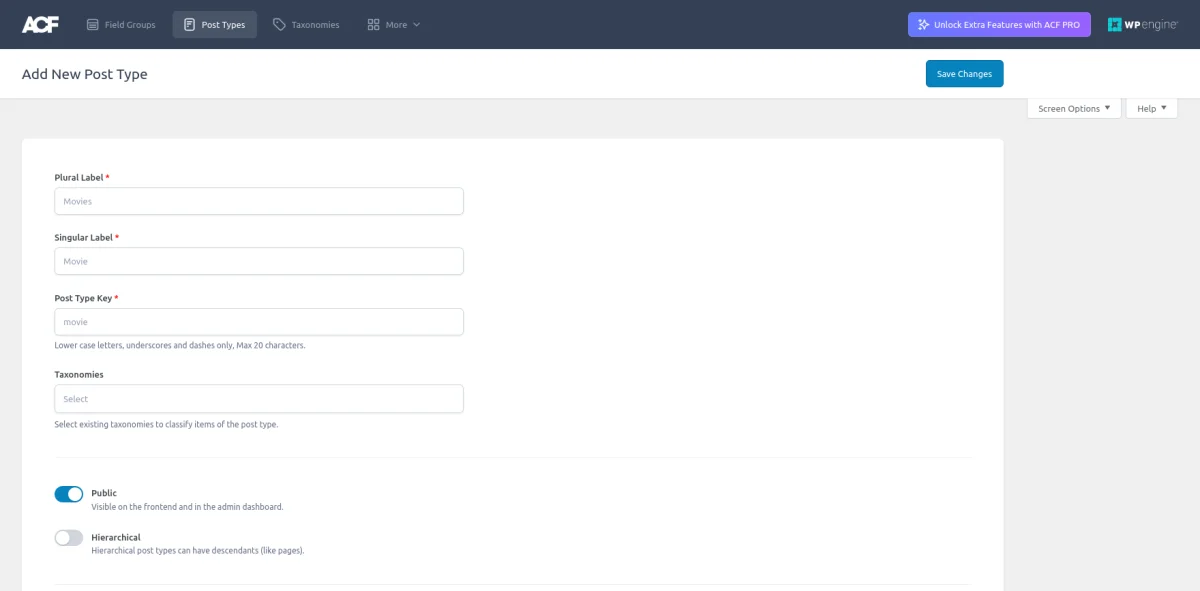
ACF offers CPT and Taxonomy management features in its Basic (free) version. It boasts a smooth and intuitive UI, simplifying defining and configuring CPTs and Taxonomies. Behind the scenes, ACF stores your settings as items within its CPTs (acf-post-type, acf-taxonomy), and dynamically registers the defined CPTs and Taxonomies.
Meta Box

Similarly, Meta Box provides CPT and Taxonomy management capabilities via the free add-on. Following a classic approach akin to ACF, Meta Box offers a familiar interface for defining and organizing CPTs and Taxonomies.
Both plugins offer CPT and Taxonomy management functionalities free of charge, adhering to a similar methodology. They employ tab-based UI designs to enhance the user experience, ensuring a seamless and intuitive experience for configuring and managing CPTs and Taxonomies.
Number of field types
When it comes to meta fields, the diversity of available field types plays a crucial role. It allows us to precisely define the appearance, data format, and behavior of fields.
ACF
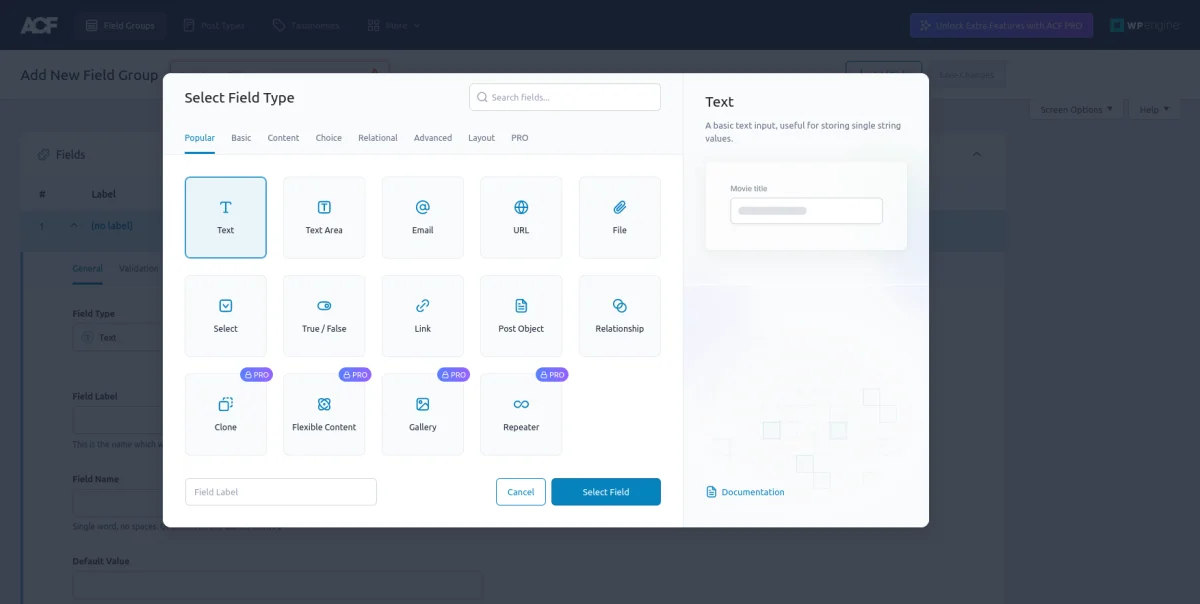
The ACF plugin offers 30 free field types and 4 paid options.
Meta Box
Note: Unlike ACF and Pods, Meta Box does not provide a built-in UI for field creation. Users that don't want to use code can either utilize the free online official field configuration generator or choose to purchase an add-on that offers a UI for field creation.
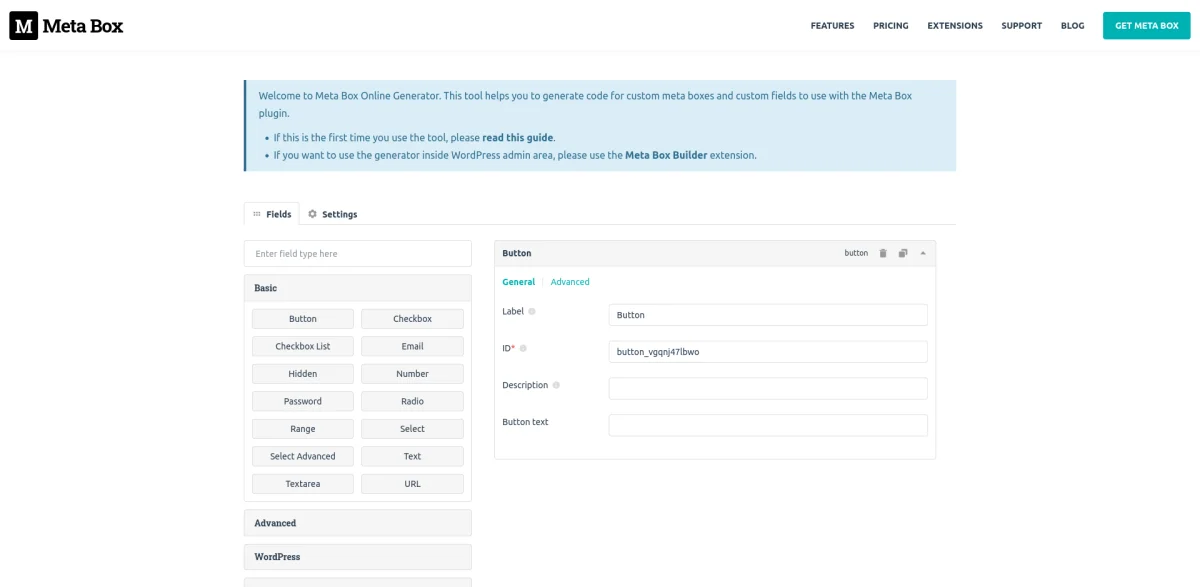
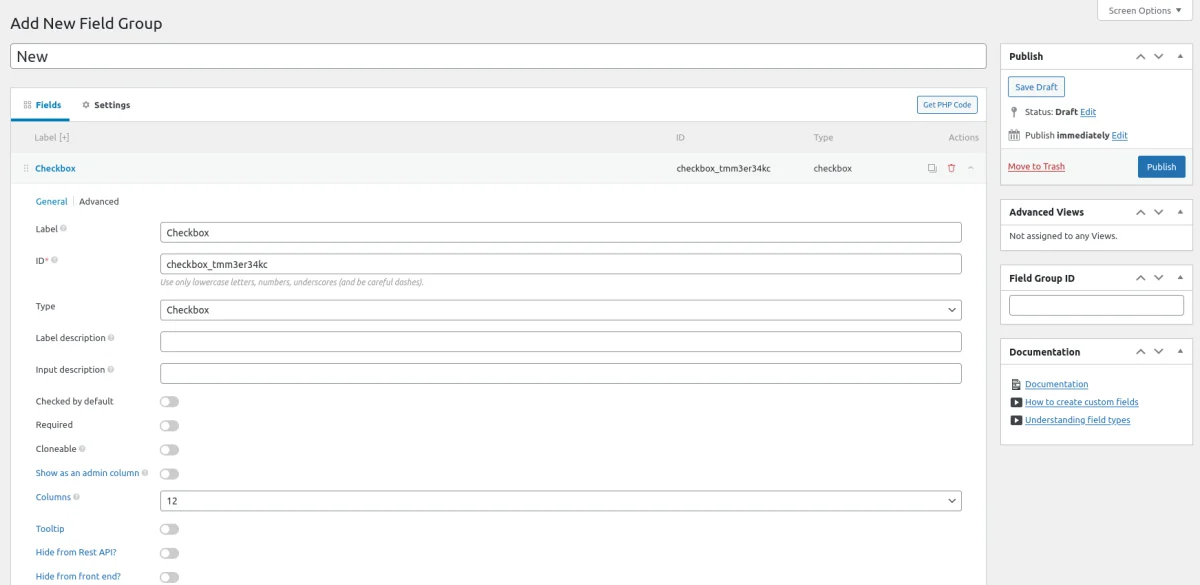
In contrast, the Meta Box plugin boasts 50 free field types and 1 paid option.
While it might seem that Meta Box provides a wider array of field types compared to ACF, the distinction is not as straightforward in practice. It signifies a different approach to field types.
For instance, ACF may offer a single field type for a basic image, whereas Meta Box might provide four distinct field types for handling images, each offering unique appearances and behaviors for editors. Thus, when considering the number of unique data types, both plugins are relatively similar.
The advantage of Meta Box lies in its capability to offer various field types for the same data type, granting users finer control over the appearance of fields for administrators. However, this can also introduce more decision-making during the field creation process, particularly for users new to Meta Box.
Conditional field logic
Another vital feature that enhances the functionality of meta fields is conditional field logic. This functionality allows us to control the appearance of fields based on specific conditions, offering greater flexibility and customization options. With conditional field logic, we can associate field groups with specific pages or conditions, rather than applying them globally across all content.
Moreover, conditional field logic empowers us to manage field visibility within the group itself. For example, we can incorporate a 'type' selection field and display different sets of fields based on the value chosen in the selection.
Note: It's important to clarify that conditional field logic primarily affects the appearance and behavior of fields within the editor screens of WordPress, rather than impacting how fields appear on the frontend of the website.
ACF
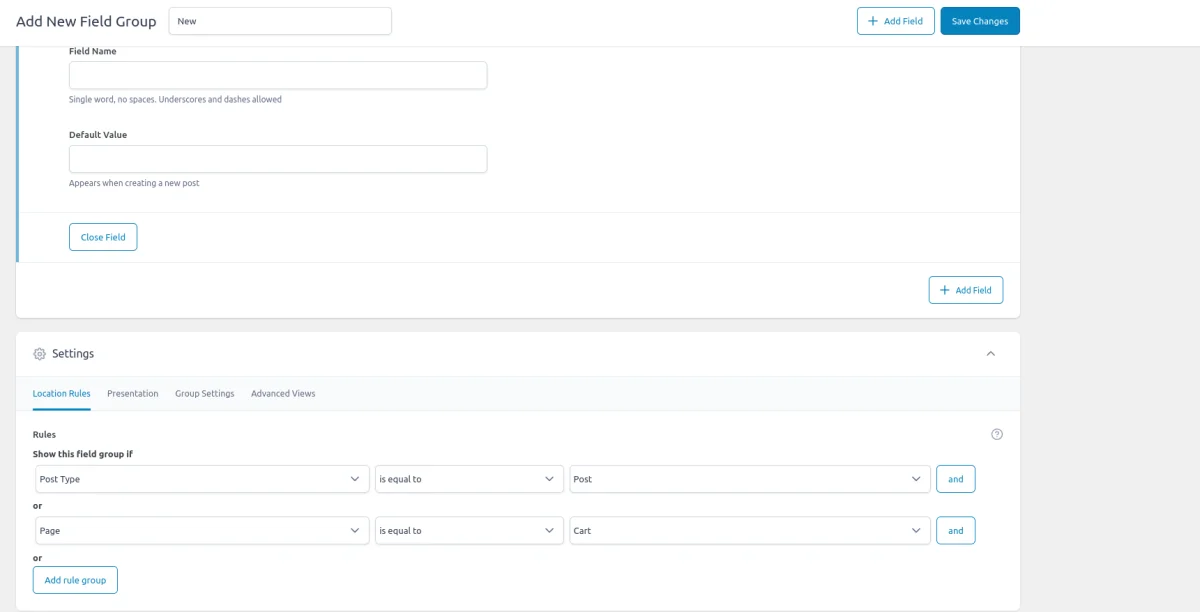
Both the ACF Basic and Pro plugins include conditional field logic out-of-the-box, providing users with powerful tools to customize field behavior based on various conditions and criteria.
Meta Box

Conditional logic is available in Meta Box as a paid addon, offering users the flexibility to incorporate advanced field visibility rules and conditions into their WordPress projects.
Options pages
Options pages represent another valuable feature that facilitates the creation of custom settings pages within WordPress. This functionality proves extremely handy when you want to incorporate global site settings or theme-specific customizations.
While it is possible to achieve this without plugins, utilizing dedicated tools streamlines the process by providing a user-friendly UI. With these plugins, you can easily specify the page name, create fields, and associate them with the options page. The plugins take care of the rest, including page display, rendering, validation, and field saving.
ACF

The options pages feature is included as part of the ACF Pro version, offering users the ability to effortlessly create and manage custom settings pages within their WordPress sites.
Meta Box
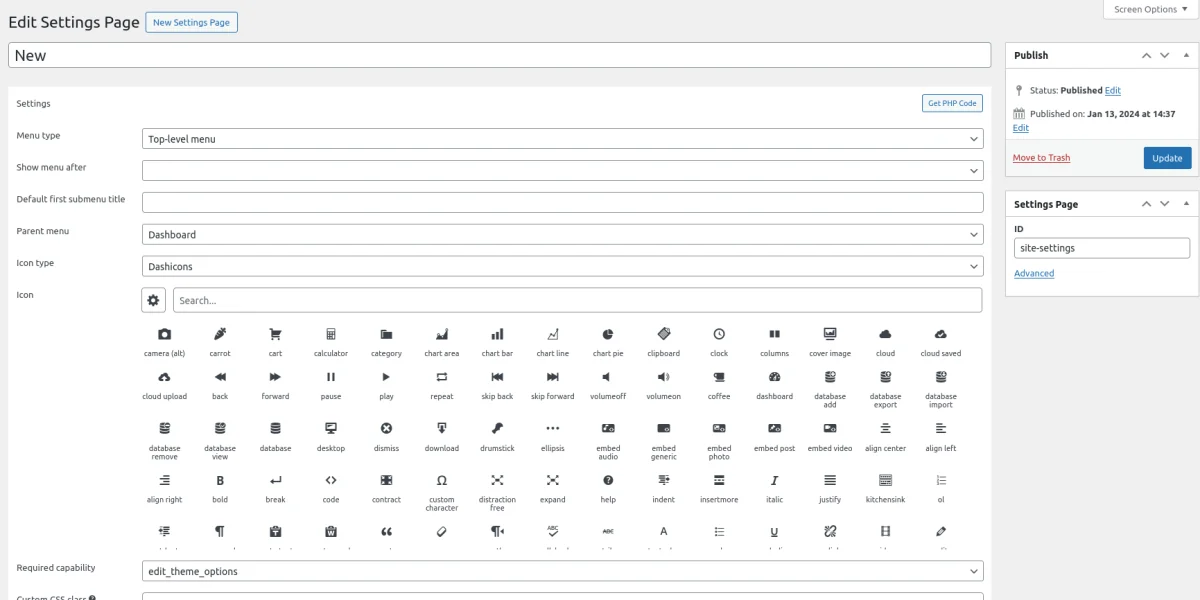
For Meta Box users, the options page feature is available as a paid add-on. This addon extends the capabilities of Meta Box, allowing users to create comprehensive options pages tailored to their specific needs and preferences.
Aside from the standard set of settings available in ACF, Meta Box provides the option to select the location, allowing you to position it either as a submenu item (e.g., under the Settings item) or as an independent item.
User and Taxonomy meta
While it's evident that meta vendor plugins enable us to add meta fields to pages, posts, or Custom Post Types, what about other WordPress objects? Often, there's a necessity to introduce custom settings to Taxonomies or User profiles. These objects utilize distinct database tables compared to pages/posts, making the ability to manage meta fields for them a separate feature.
ACF
The ACF Basic version allows users to assign meta fields to User and taxonomy term objects, providing flexibility in customizing these elements within WordPress.
Meta Box
In Meta Box, the ability to manage user and term metadata is available as paid add-ons. This addon extends the capabilities of Meta Box, enabling users to incorporate custom meta fields into User profiles and Taxonomies with ease.
Custom Gutenberg blocks
The ability to create custom Gutenberg blocks is undeniably a game-changing feature. While the Gutenberg editor offers enhanced flexibility, it lacks a comprehensive PHP API for seamlessly creating blocks with fields.
With this functionality, you can effortlessly design your own Gutenberg blocks and leverage a diverse range of available field types to configure custom settings for the block. These plugins handle the task of adding the block and rendering, freeing you to focus on the block's visual presentation.
ACF
ACF Blocks are included as part of the ACF Pro version, empowering users to craft unique Gutenberg blocks with ease and efficiency.
Meta Box
For Meta Box users, the MB Blocks feature is available as a paid add-on. This addon extends the capabilities of Meta Box, enabling users to create custom Gutenberg blocks tailored to their specific requirements and preferences.
Repeater field
It's essential to emphasize the significance of the repeater field type and the repeatable option, as these are fundamental aspects you'll encounter frequently. The repeater field type allows you to include multiple meta fields within a single row or instance, providing editors with the ability to replicate this row multiple times.
On the other hand, the repeatable option enables editors to duplicate a single field multiple times. While both features facilitate field repetition, the repeatable option is limited to a single field, whereas the repeater field can accommodate any number of fields within each repeated instance.
ACF

The repeater field is a feature included in ACF Pro, empowering users to create dynamic and flexible content structures by allowing the repetition of multiple fields within a single row.
Meta Box

While Meta Box does not have a field called 'repeater,' it offers a paid addon that adds a 'group' field with the repeatable feature. This functionality works similarly to the ACF repeater field, allowing users to create repeating groups of fields within their WordPress projects.
Table storage
Storing custom data in metafields is a conventional approach in WordPress. It's simple and allows for data querying from the same table. However, like many solutions, it's not without its drawbacks. If your project heavily relies on meta fields, especially with numerous custom fields or complex types like repeaters, it can potentially lead to performance issues.
We're not just talking about adding a few or even ten fields to your page; in such cases, the performance difference is hardly noticeable. The concern arises when dealing with a significant number of custom fields, which is quite common, especially when working with Custom Post Types.
The root of the issue lies in the storage type of these meta fields, which are stored in the universal wp_postmeta table. This table is not specifically optimized for your specific set of fields, leading to potential inefficiencies in data retrieval and processing. However, should we abandon the convenience and features that metafields offer in data-intensive projects?
Fortunately, there is a solution known as 'table storage.' The core concept behind this feature is to replace the default wp_postmeta storage with custom tables, where each Field group has its dedicated table. This approach optimizes data storage and retrieval, improving performance and scalability for projects with extensive metafield usage. Importantly, there are no changes during the field creation process or in how they appear to editors; all the optimization occurs seamlessly in the background when you save or load the page.
ACF
While ACF Pro doesn't natively offer a table storage option, there is a paid third-party add-on available that brings this functionality to ACF users, enhancing performance and scalability for their projects.
Meta Box
Meta Box provides a dedicated paid addon for table storage, enabling users to optimize data storage and retrieval for their projects with ease and efficiency.
3. Pricing
ACF offers three different yearly license tiers, while Meta Box offers six tiers, including a lifetime option. To simplify pricing comparison, we've compiled a summary of the most commonly used options.
| Plugin | 1 year for 1 website | 1 year for unlimited websites | Lifetime |
|---|---|---|---|
| ACF | 49$ (includes all Pro features) | 249$ (includes all Pro features) | not available |
| Meta Box | 49$ (includes some add-ons only) | 149$ with some add-ons 229$ with all add-ons | 299$ for 3 websites 699$ for unlimited |
Meta Box often proves to be more cost-effective for a one-year license with unlimited website usage, especially if you don't require all the add-ons. Additionally, the Meta Box lifetime license may be an attractive choice for agencies seeking long-term value.
On the other hand, ACF's advantage lies in its default bundling of all pro features into a single product, offering a straightforward pricing structure for users who require comprehensive functionality without the need for add-on customization.
4. Docs, Support and Community
Here, we will compare aspects related to 'support.' It's crucial to recognize that documentation and a vibrant community are as important as personal support. Extensive documentation and a large community can offer a treasure trove of pre-existing answers to the questions you may encounter.
ACF
ACF boasts over 2 million active installations, and comprehensive documentation, and provides support for the Basic plugin through the forum. Additionally, Pro users benefit from personalized support, ensuring timely assistance for their specific needs.
Meta Box
Meta Box has over 700,000 active installations, extensive documentation, and offers support for the Basic plugin through the forum. Similarly, Pro users enjoy personalized support, ensuring dedicated assistance tailored to their requirements.
5. Display options
We've explored the features of these plugins, and now let's delve into how field values can be showcased on the front end of your website.
Initially, these plugins served as wrappers over WordPress's native meta feature, offering code functions that encapsulated the WP get_post_meta() function. While this approach provided full control over the layout, it was also time-consuming, requiring manual work.
Over time, alternative methods emerged, each with its own set of advantages and disadvantages. Additionally, with the growing popularity of page builders, integrations for meta vendors have become more prevalent.
Furthermore, it's worth mentioning Advanced Views, a plugin that introduces smart templates, representing a modern and efficient approach to displaying your content, including meta fields.
According to the plugin's documentation, Advanced Views is a versatile and flexible tool that sets itself apart from drag-and-drop builders. It can be utilized independently or in conjunction with your preferred framework or builder.
| Plugin | Supported by Advanced Views | Code function | Shortcode | Other ways |
|---|---|---|---|---|
| ACF | yes (all the meta field types) | get_field() | for single field (with primitive type) | Page builder integrations |
| Meta Box | yes (all the meta field types, excluding 3) | rwmb_get_value() | for single field | MB Views Page builder integrations |
6. Summary
In this article, we've explored two well-known participants – ACF and Meta Box – each with a rich history and unique strengths. Your choice between them should be driven by which aligns best with your specific needs.
To illustrate, let's consider them in the context of desktop operating systems (OS).
Meta Box can be likened to Windows, offering a robust foundation for free. It's developer-friendly and customizable, though additional features may require separate payments.
On the other hand, ACF resembles MacOS, celebrated for its seamless UI and exceptional UX. However, it lacks a lifetime license and tends to be priced higher overall. Nevertheless, all the Pro features are conveniently bundled into a single Pro version.
Meta Box
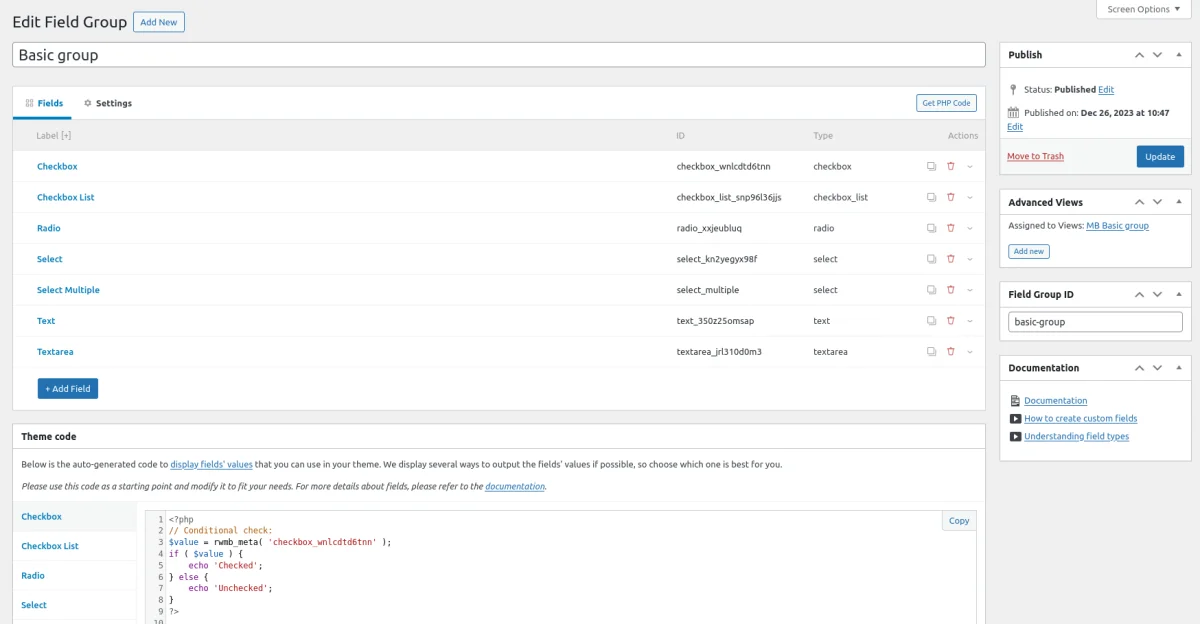
Meta Box is an excellent option for developers who are adept at working with code and value the abundance of APIs and extensive setting options it offers. With a wide selection of over 50 field types, you have the flexibility to precisely define how fields appear and behave for editors.
As a commercial product, Meta Box provides thorough documentation. However, it's important to note that additional features and personal support come at a cost. For example, if you prefer a UI for field creation (which is understandable given the complexity of field arguments), you'll need to either utilize the official online configurator or invest in purchasing an add-on.
ACF
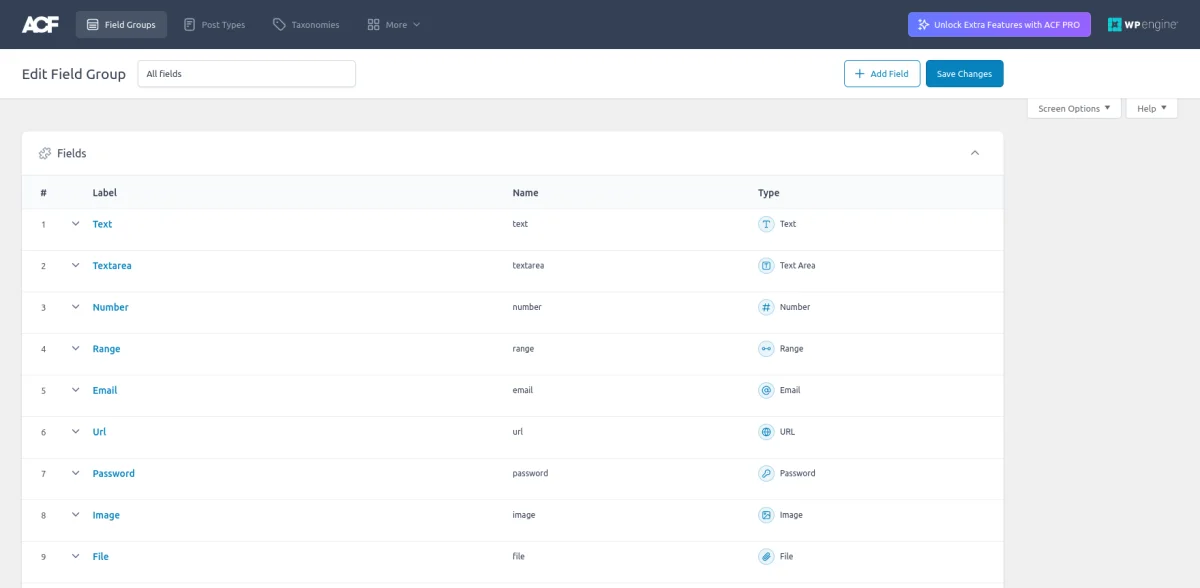
Advanced Custom Fields presents an attractive middle ground and serves as a reliable option if prioritizing a seamless UI and exceptional UX is paramount to your needs. It's particularly well-suited for various commercial development projects where access to dependable personal support is a priority. ACF distinguishes itself with its extensive documentation and the largest community among its competitors.
A superior UI and UX are especially crucial when catering to tech-savvy clients who value the flexibility to customize their website in the future. In this aspect, ACF emerges as the optimal choice, thanks to its seamless UI and the support of a large community, enabling new users to quickly and effortlessly dive into the platform.
Afterwords
We hope that this article has provided valuable insights for you. Please don't hesitate to share your thoughts or pose any questions in the comments section below. Happy development!
Thank you for reading! to our monthly newsletter to stay updated on the latest WordPress news and useful tips.

Stuck with development or facing an issue?
WPLake offers affordable on-demand website development and design.
No matter the size of your project - contact us now, and we'll get it done for you!
Frequently Asked Questions Test Your Knowledge
FAQ mode
/
Learning mode
- What are the business models of ACF and Meta Box?
ACF offers both a free Basic plugin and a paid Pro plugin, while Meta Box provides a free plugin with paid add-ons for additional features.
- How do ACF and Meta Box differ in their pricing structures?
ACF offers yearly licenses for 1 or unlimited websites, while Meta Box offers six tiers, including a lifetime option, potentially making it more cost-effective for users with multiple websites.
- What support options are available for users of ACF and Meta Box?
Both plugins offer extensive documentation and support forums, with personalized support available for Pro users, ensuring timely assistance for their specific needs.
- How can I display field values on the frontend of their websites using ACF and Meta Box?
You can utilize various methods, including code functions, shortcodes, and integrations with tools like Advanced Views.
Content links (54)
41.
docs.metabox.io

